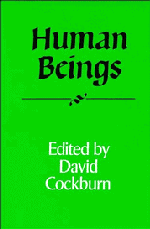Book contents
- Frontmatter
- Contents
- Introduction
- Machines as Persons?
- The Importance of Being Human
- Response to McNaughton
- Response to Diamond
- Real Selves: Persons as a Substantial Kind
- Personal Identity and Brain Transplants
- Personal Identity and the Idea of a Human Being
- Imagination and the Sense of Identity
- Radical Critique, Scepticism and Commonsense
- Getting the Subject back into the World: Heidegger's Version
- Incarnational Anthropology
- How Many Selves Make Me?
- Sartre and Our Identity as Individuals
- Bibliography
- Notes on Contributors
- Index
Introduction
Published online by Cambridge University Press: 05 February 2015
- Frontmatter
- Contents
- Introduction
- Machines as Persons?
- The Importance of Being Human
- Response to McNaughton
- Response to Diamond
- Real Selves: Persons as a Substantial Kind
- Personal Identity and Brain Transplants
- Personal Identity and the Idea of a Human Being
- Imagination and the Sense of Identity
- Radical Critique, Scepticism and Commonsense
- Getting the Subject back into the World: Heidegger's Version
- Incarnational Anthropology
- How Many Selves Make Me?
- Sartre and Our Identity as Individuals
- Bibliography
- Notes on Contributors
- Index
Summary
The papers in this volume, or earlier versions of them, were delivered at the Royal Institute of Philosophy conference on ‘Human Beings’ which was held at St David's University College, Lampeter in July 1990. It was hoped that this theme would provide a focus for discussion of a range of philosophical issues—in particular in the philosophy of mind and ethics—which, while deeply connected, are often treated in relative isolation from each other. Linked with this hope was the idea that the notion of a ‘human being’ is not one that has, in recent philosophy, been given the attention that it deserves. The relation of each of these papers to that theme creates a number of strong threads running through the volume. This is combined, however, with some radical divergences of views. In this introduction I will try to bring out both the continuities of theme and the differences in approach.
A number of the contributors to this volume are united in thinking that the notion of a human being is of crucial importance in our thought. This marks their views off from ways of thinking which have a strong hold in much contemporary philosophy. It is, for example, sometimes argued that to give the notion of a human being a fundamental position in our moral thought is to be guilty of a bias which is closely akin to racial prejudice.
- Type
- Chapter
- Information
- Human Beings , pp. 1 - 10Publisher: Cambridge University PressPrint publication year: 1991

